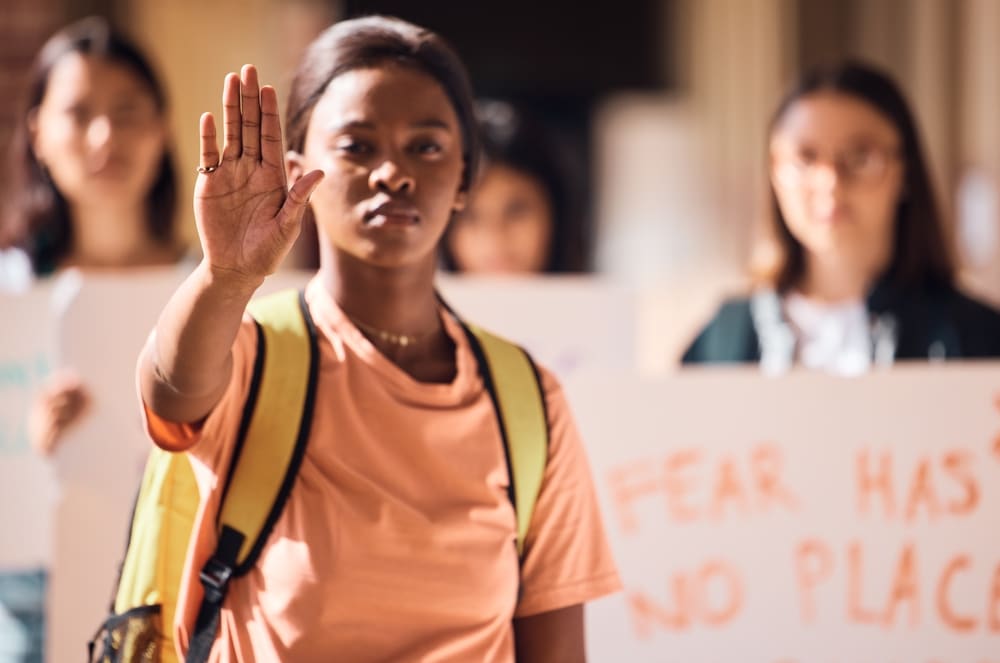Although book bans are wildly unpopular with American voters, right-wing pressure groups like Moms for Liberty have succeeded in convincing Republican lawmakers to remove titles due to their portrayals of gender diversity or racism. Now that almost all schools have reopened for the new school year, followers of education policy and politics, as well as free speech advocates, are watching closely to see if there will be efforts to pass more of these laws.
Last school year, at least seven states passed ambiguously-worded laws that criminalized school teachers and librarians for exposing students to books that have been deemed as too “obscene.” Governors in two of these states vetoed the new laws, but “[a]nother dozen states considered more than twenty similar bills this year, half of which are likely to come up again in 2024,” according to The Washington Post.
An especially extreme book banning was, the Post reported, “an Arkansas measure that says school and public librarians, as well as teachers, can be imprisoned for up to six years or fined $10,000 if they distribute obscene or harmful texts.” The law was meant to go into effect on August 1, but in July, a federal judge blocked it because it imposed a threat to First Amendment rights. The lawsuit that led to the judge’s ruling came from a broad coalition of authors, educators, and publishers that were represented in part by the progressive legal group Democracy Forward.
I spoke with Skye Perryman, founder and CEO of Democracy Forward, about the looming threats that the organized right poses to public education and which tools are useful in fighting that threat. The following is an edited version of that interview:
Glenn Daigon: What was behind the formation of Democracy Forward?
Skye Perryman: It was founded in the wake of the 2016 election when it became clear that we were in a new era of American life in the United States, where democracy was facing broader attacks with respect to the Trump Administration’s unlawful activity as well as the rise of far-right movements seeking to shape the law in regressive ways.
Q: What education issues are your organization’s highest priorities?
Perryman: We have observed a number of states and local communities that are enacting laws or policies that seek to restrict the ability of people to read…to be exposed to ideas in books. We are very focused on combating censorship and anti-democratic activity in all forms.
There is a well-resourced and coordinated effort among far-right institutions to undermine public education—whether that is through misappropriating funds like the legislature did in Mississippi to divert funds to private schools, or to pass burdensome censorship agenda laws that have led to shortages and burdens on teachers.
Q: With a new school year, what do you see as the far right’s top priorities in terms of public education policies?
Perryman: What we are seeing is a range of efforts: undermining funding for public education, pushing things like vouchers or other types of policies that only benefit some students and do not benefit all students, or continuing to stoke culture war issues through pursuing the censorship agenda that really threatens the quality of education available to students throughout the country.
Q: Which of these efforts do you see as the most dangerous to students?
Pearryman: These initiatives all emanate from the work of far-right institutions…that are trying to undermine public education. So the same groups that are pursuing broad censorship agendas, are also the groups that are pushing for policies that would undermine public schools more generally. They are all part of the same playbook.
Q: What are Democracy Forward’s tactics to blunt or block these initiatives?
Perryman: We use a range of tools and seek to make those tools available to people in communities, teachers, and parents. We are representing librarians and others in a litigation that has successfully blocked a statewide censorship law [in Arkansas] that would have imposed criminal penalties on librarians and teachers. We are working with communities in places like Texas, Florida, and Ohio to make sure that communities have access to legal resources to fight back against this.
What we see in our work every day is that the vast majority of the American people support democracy, support the notion that all people—regardless of their background, their income, or geography—deserve to have access to a quality education. We are really committed to providing communities, teachers, parents, and others with the legal and regulatory tools to be able to use their voices at this time.
Q: Would you count blocking the Arkansas censorship law as your organization’s greatest success so far?
Perryman: We have had a number of successes. Recently, we are very pleased to have been able to block the statewide censorship law on a preliminary injunction in Arkansas. We have uncovered documents and records in a variety of communities through public records requests that have exposed the relationship between these censorship efforts and special interests and far-right interests. That is good information for people in communities to have in framing their strategies.
In Mississippi, we have successfully blocked the legislature’s efforts to divert public COVID-19 funds to private schools, which is a violation of the Mississippi constitution. Those are just some examples of types of work, some of the successes that we have had.
Q: What policies seem to be the most effective in limiting the appeal of the conservative education movement?
Perryman: The far right has resourced an effort to mislead the people about the level of support that their agenda has. In reality, a lot of that fear is being stoked through a misinformation campaign and the highly coordinated effort of national organizations and funders that are seeking to shape our law and policy in a way that does not represent all people but only the privilege of some.
What we have really seen is the power in ordinary people using their voices in this time and having access to a full range of tools. But there are tools that might be harder for communities to access, such as: the ability to enforce your rights in court; to weigh in with a state or federal agency in proceedings that affect the right to education; to weigh in on court cases through briefings even if you are not the party suing; and to understand what is going on and to request records from public bodies.
We believe it is really important to harness the power of the people. [Using] those diverse tools, and making sure that folks have access to them, can be very effective in pushing back.
Q: I assume for folks who don’t know how to access agencies or request information, that is where you fill the void.
Perryman: We fill the void for that and also institutions that may have sophisticated communications, policies, or strategies, but that have not historically utilized the law or legal-based tools.
Q: Have you found that these far-right groups are not only pushing on all fronts on the issue of education, but against regulatory checks on corporations as well?
Perryman: Yes…the vast majority of American people believe in democracy, they want their government to deliver for people, and they want their government to serve all people and not just some people.
LISTEN: The Right’s Long War on Public Education, with Jennifer Berkshire
There is a far-right movement that is seeking to undermine that promise. Whether that is undermining the ability of people to vote…of government at all levels to deliver for people, such as the attacks on student debt relief, economic opportunity, or on the very foundations of freedom of expression and freedom of speech. We work across a range of issues that matter to people in communities, not just education. We see a lot of common players and a lot of common themes across those areas.
It is no surprise that the same forces that want to undermine the ability of people to vote, also want to undermine the ability of people to be educated well.
This article was originally published in The Progressive and reprinted here with permission.






